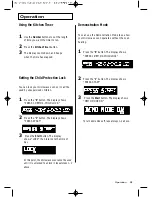
S
AFETY
2
S
AFETY
PRECAUTIONS TO AVOID POSSIBLE
EXPOSURE TO EXCESSIVE
MICROWAVE ENERGY
Failure to observe the following safety precautions
may result in harmful exposure to microwave energy.
(a) Under no circumstances should any attempt be
made to operate the oven with the door open or
to tamper with the safety interlocks (door latch-
es) or to insert anything into the safety interlock
holes.
(b) Do not place any object between the oven door
and front face or allow food or cleaner residues
to accumulate on sealing surfaces. Ensure that
the door and door sealing surfaces are kept
clean by wiping after use first with a damp cloth
and then with a soft dry cloth.
(c) Do not operate the oven if it is damaged until it
has been repaired by a qualified microwave ser-
vice technician trained by the manufacturer.
It is particularly important that the oven door
closes properly and that there is no damage to
the:
(1) Door, door seals and sealing surfaces
(2) Door hinges (broken or loosened)
(3) Power cable
(d) The oven should not be adjusted or repaired by
anyone other than a properly qualified
microwave service technician trained by the
manufacturer.
Important Safety Instructions.
Read Carefully and keep for future reference.
Before cooking food or liquids in your
microwave oven, please check that the follow-
ing safety precautions are taken.
1. DO NOT use any metallic cookware in the microwave
oven :
◆
Metallic containers
◆
Dinnerware with gold or silver trimmings
◆
Skewers, forks, etc.
Reason : Electric arcing or sparking may occur and
may damage the oven.
2. DO NOT heat:
◆
Airtight or vacuum-sealed bottles, jars, containers
Ex) Baby food jars
◆
Airtight food.
Ex) Eggs, nuts in shells, tomatoes
Reason : The increase in pressure may cause them
to explode.
Tip:
Remove lids and pierce skins, bags, etc.
3. DO NOT operate the microwave oven when it is empty.
Reason : The oven walls may be damaged.
Tip :
Leave a glass of water inside the oven at
all times. The water will absorb the
microwaves if you accidentally set the oven
going when it is empty.
4. DO NOT cover the rear ventilation slots with cloths or
paper.
Reason : The cloths or paper may catch fire as hot
air is evacuated from the oven.
5. ALWAYS use oven gloves when removing a dish from
the oven.
Reason : Some dishes absorb microwaves and heat
is always transferred from the food to the
dish.The dishes are therefore hot.
6. DO NOT touch heating elements or interior oven walls.
Reason:
These walls may be hot enough to burn even after
cooking has finished, even though they do not
appear to be so. Do not allow inflammable
materials to come into contact with any interior area
of the oven. Let the oven cool down first.



































